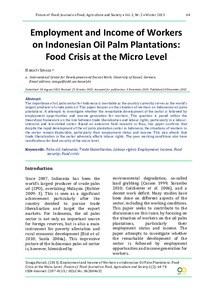Datum
2013-12-20Autor
Sinaga, HariatiSchlagwort
630 Landwirtschaft, VeterinärmedizinMetadata
Zur Langanzeige
Aufsatz

Employment and Income of Workers on Indonesian Oil Palm Plantations: Food Crisis at the Micro Level
Zusammenfassung
The importance of oil palm sector for Indonesia is inevitable as the country currently serves as the world’s largest producer of crude palm oil. This paper focuses on the situation of workers on Indonesian oil palm plantations. It attempts to investigate whether the remarkable development of the sector is followed by employment opportunities and income generation for workers. This question is posed within the theoretical framework on the link between trade liberalisation and labour rights, particularly in a labour-intensive and low-skilled sector. Based on extensive field research in Riau, this paper confirms that despite the rapid development of the oil palm plantation sector in Indonesia, the situations of workers in the sector remain deplorable, particularly their employment status and income. This also attests that trade liberalisation in the sector adversely affects labour rights. The poor working conditions also have ramifications for food security at the micro level.
Zitierform
In: Future of Food: Journal on Food, Agriculture and Society. Witzenhausen : University of Kassel, Department of Organic Food Quality and Food Culture. - Vol. 1, No. 2 (2013), S. 64-78Zitieren
@article{urn:nbn:de:hebis:34-2014021145105,
author={Sinaga, Hariati},
title={Employment and Income of Workers on Indonesian Oil Palm Plantations: Food Crisis at the Micro Level},
year={2013}
}
0500 Oax 0501 Text $btxt$2rdacontent 0502 Computermedien $bc$2rdacarrier 1100 2013$n2013 1500 1/eng 2050 ##0##urn:nbn:de:hebis:34-2014021145105 3000 Sinaga, Hariati 4000 Employment and Income of Workers on Indonesian Oil Palm Plantations: Food Crisis at the Micro Level / Sinaga, Hariati 4030 4060 Online-Ressource 4085 ##0##=u http://nbn-resolving.de/urn:nbn:de:hebis:34-2014021145105=x R 4204 \$dAufsatz 4170 7136 ##0##urn:nbn:de:hebis:34-2014021145105
<resource xsi:schemaLocation="http://datacite.org/schema/kernel-2.2 http://schema.datacite.org/meta/kernel-2.2/metadata.xsd"> 2014-02-11T12:41:18Z 2014-02-11T12:41:18Z 2013-12-20 2197-411X urn:nbn:de:hebis:34-2014021145105 http://hdl.handle.net/123456789/2014021145105 eng Department of Organic Food Quality and Food Culture at the University of Kassel, Germany and Federation of German Scientists (VDW) Urheberrechtlich geschützt https://rightsstatements.org/page/InC/1.0/ Palm oil Indonesia Trade liberalisation Labour rights Employment Income Food security Food crisis 630 Employment and Income of Workers on Indonesian Oil Palm Plantations: Food Crisis at the Micro Level Aufsatz The importance of oil palm sector for Indonesia is inevitable as the country currently serves as the world’s largest producer of crude palm oil. This paper focuses on the situation of workers on Indonesian oil palm plantations. It attempts to investigate whether the remarkable development of the sector is followed by employment opportunities and income generation for workers. This question is posed within the theoretical framework on the link between trade liberalisation and labour rights, particularly in a labour-intensive and low-skilled sector. Based on extensive field research in Riau, this paper confirms that despite the rapid development of the oil palm plantation sector in Indonesia, the situations of workers in the sector remain deplorable, particularly their employment status and income. This also attests that trade liberalisation in the sector adversely affects labour rights. The poor working conditions also have ramifications for food security at the micro level. open access In: Future of Food: Journal on Food, Agriculture and Society. Witzenhausen : University of Kassel, Department of Organic Food Quality and Food Culture. - Vol. 1, No. 2 (2013), S. 64-78 Sinaga, Hariati </resource>
Die folgenden Lizenzbestimmungen sind mit dieser Ressource verbunden:
Urheberrechtlich geschützt

